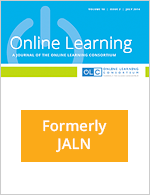Course Assessment Practices and Student Learning Strategies in Online Courses
Perhaps the most promising and understudied aspect of online education is course assessment. Course assessment is important because it has a strong impact on learning and is an indicator of the quality of learning occurring in a class. In the online environment, methods of assessment can be very different. However,...

